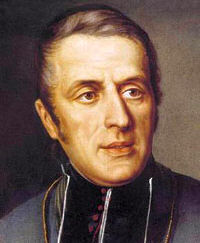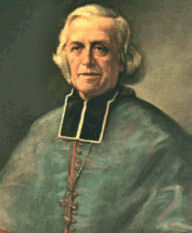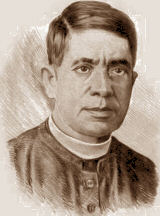
Collect: Almighty and eternal God, who made the Priest Saint Christopher Magallanes and his companions faithful to Christ the King even to the point of martyrdom, grant us, through their intercession, that, persevering in confession of the true faith, we may always hold fast to the commandments of your love. Through our Lord Jesus Christ, your Son, who lives and reigns with you in the unity of the Holy Spirit, one God, for ever and ever.
o Sopa de Habas (Fava Bean Soup)
o Mary, the Mother of our Children
o May, the Month of Mary
o Litany of the Blessed Virgin Mary (Litany of Loretto)
o Prayer for the Missions in Honor of St. Eugene de Mazenod
o Novena to St. Rita
o Novena in Honor of St. Eugene
o Bear Courageous Witness to Christian Life | Pope John Paul II
o Our Lady of Laus Now On a Par with Lourdes | Paul Likoudis
o They Loved in Deed and in Truth | Pope John Paul II
o Viva Cristo Rey! The Cristeros Versus the Mexican Revolution | Christopher Check
· Easter: May 21st
· Optional Memorial of St. Christopher Magallanes, priest and martyr, and his companions, martyrs; Optional Memorial of St. Eugene de Mazenod, bishop (Canada)
In 1815, St. Eugene de Mazenod founded the Congregation of the Oblates of Mary Immaculate to evangelize the poorest populations of Provence that were being neglected. He then sent his missionaries to proclaim the Gospel in America, South Africa and Asia. Later on, he was appointed Vicar General of Marseilles and, in 1836, Bishop of this same diocese. Until his death on May 21, 1861, he was at the service of his people with an extraordinary pastoral charity, nourished by an intense interior life. In his city, rapidly developing at the time, he created numerous parishes, built new churches and installed new Religious Institutes. — Cardinal Bernard Gantin
Saint Christopher Magallanes was joined in martyrdom by twenty-one diocesan priests and three devout laymen, all members of the Cristeros movement, who rose up in rebellion against the anti-Catholic Mexican government during the 1920s. Having erected a seminary at Totatiche, he secretly spread the Gospel and ministered to the people. Captured by government authorities, he was heard to shout from his jail cell: "I am innocent and I die innocent. I forgive with all my heart those responsible for my death, and I ask God that the shedding of my blood serve the peace of our divided Mexico." This optional memorial is new to the USA liturgical calendar and will be inscribed on May 21.
St. Eugene de Mazenod

St. Eugene De Mazenod, refused to follow the established modes expected of someone born into nobility. From an early age, Eugene was troubled by the living conditions of the poor and their degraded status in society. When he became a priest, Eugene was not satisfied to accept the traditional role of a pastor serving a large, affluent parish. Instead, he sought out the poor laborers and preached the message of God’s love — a message they had not heard before.
Born in France in 1782, Eugene lived amid turmoil in his country and in his family. Although he grew up with the privileges and luxuries of wealth, his family life was far from ideal. His parents came from very different backgrounds and they eventually divorced, a rarity for Catholics in the 18th century.
As the French Revolution grew, Eugene’s family was forced into exile, and at different times, he was separated from his mother or father for years at a time.
After years of struggling to find his place in life, Eugene experienced a conversion at the age of 25 and entered the seminary. He was ordained a priest in 1811. In 1816, Eugene invited others to join in his ministry to the poor and founded the Missionary Oblates of Mary Immaculate. Since that time, thousands of Oblate priests and brothers have dedicated their lives to serving those most in need. He died on May 21, 1861.
On December 3, 1995, Pope John Paul II canonized Eugene De Mazenod a saint and recognized his example of untiring dedication to the poor.
— Excerpted from Missionary Oblates of Mary Immaculate Website
Patron: Dysfunctional families.
Things to Do:
St. Christopher Magallanes and Companions

Like Blessed Miguel Agustin Pro, S.J. (November 23), Cristobal and his twenty-four companion martyrs lived under a very anti-Catholic government in Mexico, one determined to weaken the Catholic faith of its people. Churches, schools and seminaries were closed; foreign clergy were expelled. Cristobal established a clandestine seminary at Totatiche, Jalisco. Magallanes and the other priests were forced to minister secretly to Catholics during the presidency of Plutarco Calles (1924-1928).
All of these martyrs except three were diocesan priests. David, Manuel and Salvador were laymen who died with their parish priest, Luis Batis. All of these martyrs belonged to the Cristero movement, pledging their allegiance to Christ and to the church that he established to spread the Good News in society—even if Mexico's leaders had made it a crime to receive baptism or celebrate the Mass.
These martyrs did not die as a single group but in eight Mexican states, with Jalisco and Zacatecas having the largest number. They were beatified in 1992 and canonized eight years later.
— Excerpted from Saint of the Day, Leonard Foley, O.F.M.
1. I am the true vine, and my Father is the husbandman.
2. Every branch in me that bears not fruit he takes away: and every branch that bears fruit, he purges it, that it may bring forth more fruit.
3. Now you are clean through the word which I have spoken to you.
HILARY. He rises in haste to perform the sacrament of His final passion in the flesh (such is His desire to fulfill His Father's commandment) and therefore takes occasion to unfold the mystery of His assumption of His flesh, whereby He supports us, as the vine does its branches: I am the true vine.
AUG. He says this as being the Head of the Church, of which we are the members, the Man Christ Jesus; for the vine and the branches are of the same nature. When He says, I am the true vine, He does not mean really a vine; for He is only called so metaphorically, not literally, even as He is called the Lamb, the Sheep, and the like; but He distinguishes Himself from that vine to whom it is said, How you are turned into the degenerate plant of a strange vine to me (Jer 11:21). For how is that a true vine, which when grapes are expected from it, produces only thorns?
HILARY. But He wholly separates this humiliation in the flesh from the form of the Paternal Majesty, by setting forth the Father as the diligent husbandman of this vine: And My Father is the husbandman.
AUG. For we cultivate God, and God cultivates us. But our culture of God does not make Him better: our culture is that of adoration, not of plowing: His culture of us makes us better. His culture consists in extirpating all the seeds of wickedness from our hearts, in opening our heart to the plow, as it were, of His word, in sowing in us the seeds of His commandments, in waiting for the fruits of piety.
CHRYS. And forasmuch as Christ was sufficient for Himself, but His disciples needed the help of the Husbandman, of the vine He says nothing, but adds concerning the branches, Every branch in Me that bears not fruit, He takes away. By fruit is meant life, i.e. that no one can be in Him without good works.
HILARY. The useless and deceitful branches He cuts down for burning.
CHRYS. And inasmuch as even the best of men require the work of the husbandman, He adds, And every branch that bears fruit, He purges it, that it may bring forth more fruit. He alludes here to the tribulations and trials which were coming upon them, the effect of which would be to purge, and so to strengthen them. By pruning the branches we make the tree shoot out the more.
AUG. And who is there in this world so clean, that he cannot be more and more changed? Here, if we say that we have no sin, we deceive ourselves. He cleans then the clean, i.e. the fruitful, that the cleaner they be, the more fruitful they may be. Christ is the vine, in that He said, My Father is greater than I; but in that He said, I and My Father are one, He is the husbandman; not like those who carry on an external ministry only; for He gives increase within.
Thus He calls Himself immediately the cleanser of the branches: Now you are clean through the word, which I have spoken to you. He performs the part of the husbandman then, as well as of the vine. But why does He not say, you are clean by reason of the baptism wherewith you are washed? Because it is the word in the water which cleans. Take away the word, and what is the water, which but water.
Add the word to the element, and you have a sacrament. Whence has the water such virtue as that by touching the body, it cleans the heart, but by the power of the word, not spoken only, but believed? For in the word itself the passing sound is one thing, the abiding virtue another. This word of faith is of such avail in the Church of God that by Him who believes, presents, blesses, sprinkles the infant, it cleanses that infant, though itself is unable to believe.
CHRYS. You are clean through the word which I have spoken to you, i.e., you have been enlightened by My doctrine, and been delivered from Jewish error.
4. Abide in me, and I in you. As the branch cannot bear fruit of itself, except it abide in the vine; no more can you, except you abide in me.
5. I am the vine, you are the branches: He that abides in me, and I in him, the same brings forth much fruit: for without me you can do nothing.
6. If a man abide not in me, he is cast forth as a branch, and is withered; and men gather them, and cast them into the fire, and they are burned.
7. If you abide in me, and my words abide in you, you shall ask what you will, and it shall be done to you.
CHRYS. Having said that they were clean through the word which He had spoken to them, He now taught them that they must do their part.
AUG. Abide in Me, and I in you: not they in Him, as He in them; for both are for the profit not of Him, but them. The branches do not confer any advantage upon the vine, but receive their support from it: the vine supplies nourishment to the branches, takes none from them: so that the abiding in Christ, and the having Christ abiding in them, are both for the profit of the disciples, not of Christ; according to what follows, As the branch cannot bear fruit of itself, except it abide in the vine, no more can you, except you abide in Me.
Great display of grace! He strengthens the hearts of the humble, stops the mouth of the proud. They who hold that God is not necessary for the doing of good works, the subverters, not the asserters, of free will, contradict this truth. For he who thinks that he bears fruit of himself, is not in the vine; he who is not in the vine, is not in Christ; he who is not in Christ, is not a Christian.
ALCUIN. All the fruit of good works proceeds from this root. He who has delivered us by His grace, also carries us onward by his help, so that we bring forth more fruit. Wherefore He repeats, and explains what He has said: I am the vine, you are the branches. He that abides in Me, by believing, obeying, persevering, and I in Him, by enlightening, assisting, giving perseverance, the same, and none other, brings forth much fruit.
AUG. But lest any should suppose that a branch could bring forth a little fruit of itself, He adds, For without Me you can do nothing. He does not say, you can do little. Unless the branch abides in the vine, and lives from the root, it can bear no fruit whatever. Christ, though He would not be the vine, except He were man, yet could not give this grace to the branches, except He were God.
CHRYS. The Son then contributes no less than the Father to the help of the disciples. The Father changes, but the Son keeps them in Him, which is that which makes the branches fruitful. And again, the cleansing is attributed to the Son also, and the abiding in the root to the Father who begot the root. It is a great loss to be able to do nothing, but He goes on to say more than this: If a man abide not in Me, he is cast forth as a branch, i.e. shall not benefit by the care of the husbandman, and withers, i.e., shall lose all that it desires from the root, all that supports its life, and shall die.
ALCUIN. And men gather them, i.e., the reapers, the Angels, and cast them into the fire, everlasting fire, and they are burned.
AUG. For the branches of the vine are as contemptible, if they abide not in the vine, as they are glorious, if they abide. One of the two the branch must be in, either the vine, or the fire: if it is not in the vine, it will be in the fire.
CHRYS. Then He shows what it is to abide in Him. If you abide in Me, and My words abide in you, you shall ask what you will and it shall be done to you. It is to be shown by their works.
AUG. For then may His words be said to abide in us, when we do what He has commanded, and love what He has promised. But when His words abide in the memory and are not found in the life, the branch is not accounted to be in the vine, because it derives no life from its root. So far as we abide in the Savior we cannot will any thing that is foreign to our salvation.
We have one will, insofar as we are in Christ, another, insofar as we are in this world And by reason of our abode in this world, it sometimes happens that we ask for that which is not expedient, through ignorance. But never, if we abide in Christ, will He grant it us, Who does not grant except what is expedient for us. And here we are directed to the prayer, Our Father. Let us adhere to the words and the meaning of this prayer in our petitions, and whatever we ask will be done for us.
8. Herein is my Father glorified, that you bear much fruit; so shall you be my disciples.
CHRYS. Our Lord showed above, that those who plotted against them should be burned, inasmuch as they abode not in Christ: now He shows that they themselves would be invincible, bringing forth much fruit; Herein is My Father glorified, that you bear much fruit: as if He said, If it appertains to My Father's glory that you bring forth fruit, He will not despise His own glory. And he that brings forth fruit is Christ's disciple: So shall you be My disciples.
THEOPHYL. The fruit of the Apostles are the Gentiles, who through their teaching were converted to the faith, and brought into subjection to the glory of God.
AUG. Made bright or glorified; the Greek word may be translated in either way. In Greek it signifies glory; not our own glory, we must remember, as if we had it of ourselves: it is of His grace that we have it; and therefore it is not our own but His glory. For from whom shall we derive our fruitfulness, but from His mercy preventing us.
Wherefore He adds, As My Father has loved Me, even so love I you. This then is the source of our good works. Our good works proceed from faith which works by love: but we could not love unless we were loved first: As My Father has loved Me, even so love I you. This does not prove that our nature is equal to His, as His is to the Father's, but the grace, whereby He is the Mediator between God and man, the man Christ Jesus. The Father loves us, but in Him.
CHRYS. If then I love you, be of good cheer; if it is the Father's glory that you bring forth good fruit, bear no evil. Then to rouse them to exertion, He adds, Continue you in My love; and then shows how this is to be done: If you keep My commandments, you shall abide in My love.
Catena Aurea John 15







